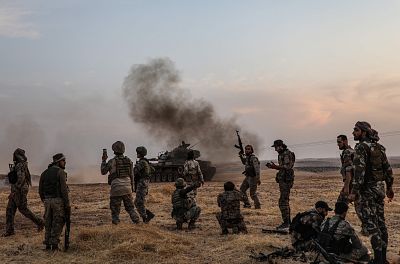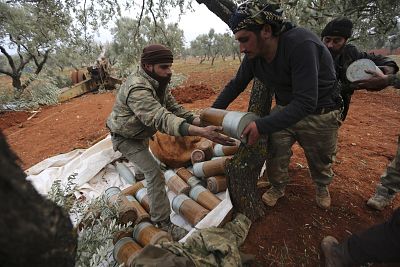Euronews | Kristina Jovanovski and Saphora Smith and Ammar Cheikh Omar with NBC News World News: The nearly nine-year-long Syrian civil war has faded from headlines amid competing international tensions and crises, but a renewed push by government forces has prompted aid groups to raise the alarm about the "staggering exodus" of people from the country's northwest.
Russian-backed Syrian forces have pounded towns and villages in Idlib, the last remaining rebel-held stronghold — forcing at least 150,000 to flee in the past two weeks, according to rights groups.
Meanwhile, neighboring Turkey, which has taken in millions of refugees, is accused of forcing some of them back into the "war zone."
"I can't remember how many times I have had to movebecause of the intense bombing and the advance of the Syrian army," said a 36-year-old Syrian who uses the name Abu Ziyad. Abu means "father of" and is often used as a nickname.
He said he fled besieged eastern Ghouta with his family two years ago but found himself displaced once again this week.
[caption id="" align="alignnone" width="1263"] Turkish soldiers and Turkish-backed Syrian fighters gather on the northern outskirts of the Syrian city of Manbij near the Turkish border in October. Zein Al Rifai[/caption]
Turkish soldiers and Turkish-backed Syrian fighters gather on the northern outskirts of the Syrian city of Manbij near the Turkish border in October. Zein Al Rifai[/caption]
He and an estimated 3 million people have lived in Idlib, the country's last opposition-held region, where government forces have recently been advancing town by town in an effort to retake the area.
Aid organizations and human rights groups have raised the alarm over reports of attacks on schools, markets and medical facilities, and the International Rescue Committee estimates that close to 300 civilians have been killed as a result of the intensifying hostilities.
"The exodus of people is staggering, and tens of thousands more are joining them every day," Andrew Morley, the president of aid group World Vision International, said as part of an urgent call by eight aid agencies for an immediate cease-fire.
Meanwhile, rights organizations have accused Turkey of deporting Syrians back to the conflict zone — a charge that Ankara denies. Human Rights Watch said "dozens of Syrians and possibly many more" were sent back between January and September last year and Amnesty International said it verified 20 cases of deportations, but estimated hundreds were likely deported in the last few months.
[caption id="" align="alignnone" width="1263"] Syrian rebel fighters prepare to fire at government positions in Idlib province, Syria on Thursday. Ghaith Alsayed[/caption]
Syrian rebel fighters prepare to fire at government positions in Idlib province, Syria on Thursday. Ghaith Alsayed[/caption]
"Turkish officials' claims that all Syrians returning to their country are happy to go ring hollow in the face of evidence to the contrary," Gerry Simpson, of Human Rights Watch, said in the report. "Turkey hosts four times as many Syrians as the European Union, but that does not mean it can return them to a war zone."
Haytham Abdallah said he was returned from Turkey to Syria in July and did not go willingingly.
"You feel like a criminal," said Abdallah, 40, who added that his wife and three children were forced to follow because they couldn't survive in Istanbul without a breadwinner.
Abdallah, who spoke to NBC News in October, says he and his family now live a kind of half-life in a camp in Azaz in northwestern Syria, waiting for food handouts from aid groups. He provided a photo of an identity card issued by the Turkish authorities which allows him to live the country.
It is places like Azaz in which Turkish President Recep Tayyip Erdogan said he wanted to create a "safe zone" after launching an incursion against U.S.-backed Kurdish forces there in October. Ankara said the area would allow Syrians to live securely in their home country.
But Abdallah said such a safe zone would end up being a large refugee camp where no one could lead regular lives.
"These are not safe zones, they are prisons," he said.
Fears are growing that internally displaced civilians who are trying to flee fighting by traveling north toward the Turkish border could end up here. If the violence continues in northwest Syria, the International Rescue Committee says it is concerned that up to 800,000 people currently in the line of fire will be left with few options for safety.
Then, there are the 1 million Syrian refugees whom Erdogan wants to return out of the 3.7 million that Turkey hosts.
In Istanbul, Abdelrahman said he is afraid he could be among those sent back.
After deserting the Syrian army, he thought that in Turkey he had found refuge from forces he was certain would kill him. But he is now anguished that he will once again be forced to live under the dictator from whose rule he fled.
"We are scared that the Syrian regime and the Turkish government will reconcile [and] at that time, 99 percent of the Syrian people will face death," Abdelrahman, who did not want his last name used out of fear for his safety, said in October.
Support from Russia and Iran has given Syrian President Bashar al-Assad the upper hand in the country's nearly nine-year-long conflict, enabling him to win back most territory. But the fight is not over and Erdogan threatened Wednesday to drive back Syrian troops in Idlib unless they withdraw by the end of the month.
It is unclear when or how the war will end, but its toll on the most vulnerable continues.
"We are very tired from escaping and being displaced," said Abu Ziyad, as he moved north with his four children.
"What is their guilt?" he asked. "They are innocent."
Kristina Jovanovski and Ammar Cheikh Omar reported from Istanbul and Saphora Smith from London.

 QR code
QR code